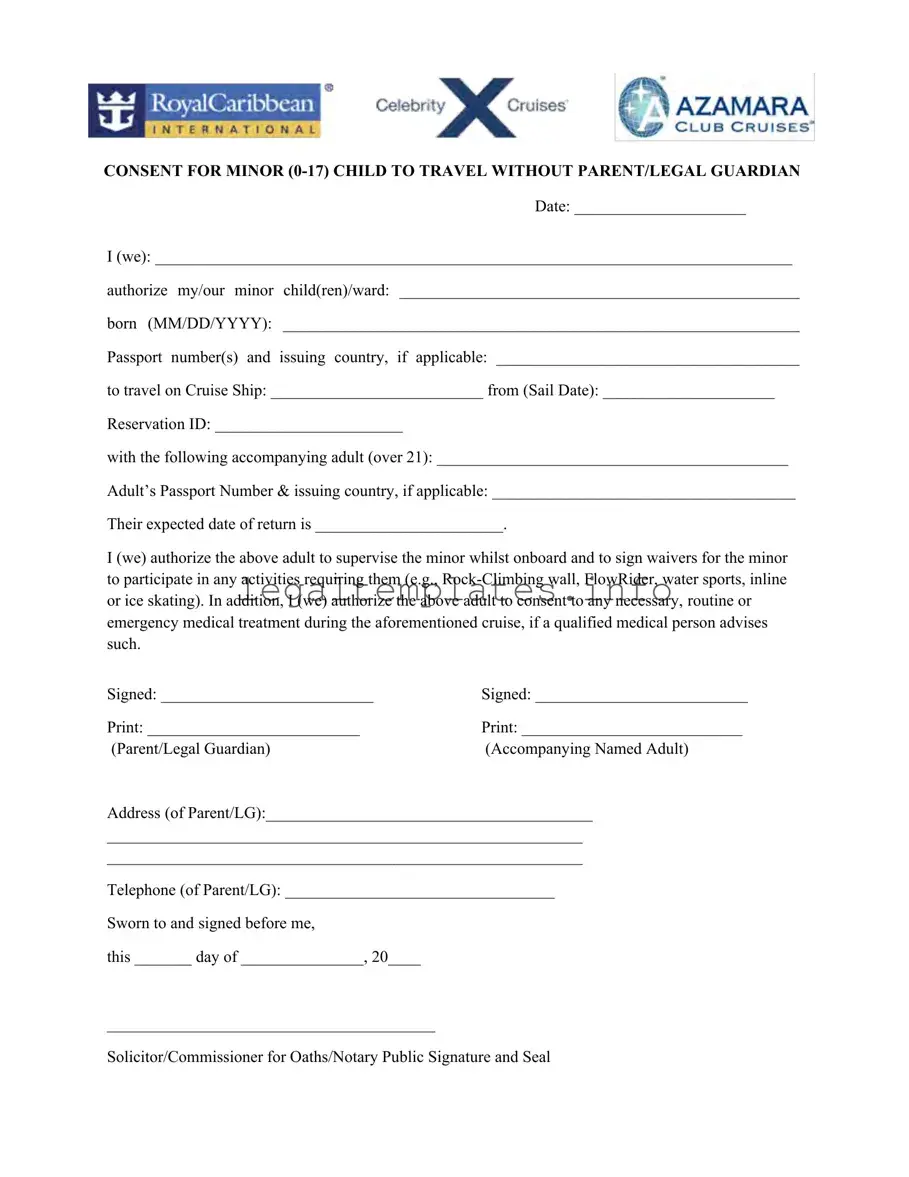A Medical Consent Form shares similarities with the Royal Caribbean Parental Consent form as it grants permission for another party to make medical decisions. This might be necessary when minor children are not accompanied by their parents, ensuring they receive care in emergencies. The clear designation of decision-making authority is central to both documents, emphasizing the safety and well-being of the minors involved.
Just like the Royal Caribbean Parental Consent form, a Child Travel Consent Form is used when a child travels without their parents or legal guardians. It provides authorization for the child to travel with an appointed adult and may include details such as destination and travel dates. Both documents are crucial in ensuring the safety and security of minors while away from their primary caregivers.
A School Field Trip Permission Slip is another document that resembles the Royal Caribbean Parental Consent form. It seeks parents' approval for their children to partake in school activities outside the school premises. Safety instructions and the scope of activities are typically outlined to inform parents and ensure their consent is based on full disclosure, much like the cruise consent form does for activities while aboard or at ports of call.
Power of Attorney for Minor Child is a legal document authorizing an individual to make decisions on behalf of a minor child, including but not limited to health care, education, and general welfare. This resemblance lies in the delegation of authority from parents to another adult, a concept at the core of the Royal Caribbean Parental Consent form, though the contexts in which they operate differ significantly.
Student Exchange Program Applications often require a form of consent from the parents, acknowledging their child’s participation and understanding of the program's rules and responsibilities. This parallels the parental consent form by Royal Caribbean, as both ensure parents are informed and agree to certain terms and conditions for their child’s participation in the respective programs.
The Liability Waiver Form for Minors participating in sports or recreational activities bears a resemblance to the Royal Caribbean Parental Consent form. It typically requires parental consent to acknowledge the risks associated with the activity and releases the organization from liability in case of injury. Both forms seek to make guardians aware of potential risks and secure their agreement in advance.
An Educational Guardian Consent Form is necessary when a child will be under the care of another adult for educational purposes, possibly in a different location. This document and the Royal Caribbean consent form both act to assure that minors have the supervision and consent needed from their legal guardians, ensuring their activities are sanctioned and monitored under agreed-upon terms.
The Release Form for Photography or Film of Minors is used to obtain consent from parents or guardians for their children to be photographed or recorded. Like the parental consent form by Royal Caribbean, it’s crucial for ensuring that the adults responsible for a child agree to their participation and understand how images or footage will be used.
An Internet Use Permission Slip, often used by schools, requires parents to allow their children access to the internet or digital devices under supervised conditions. While seemingly different, it shares the goal with the Royal Caribbean Parental Consent form of informing parents and seeking their consent for specific activities children engage in, emphasizing the importance of parental oversight.
Lastly, a Summer Camp Consent Form, which facilitates minors' participation in camp activities, stands in line with the purpose of the Royal Caribbean Parental Consent form. It ensures that parents are aware of and agree to various activities, medical treatments, or outings that may occur during the camp, similar to how the cruise consent operates for activities at sea or in foreign ports.


